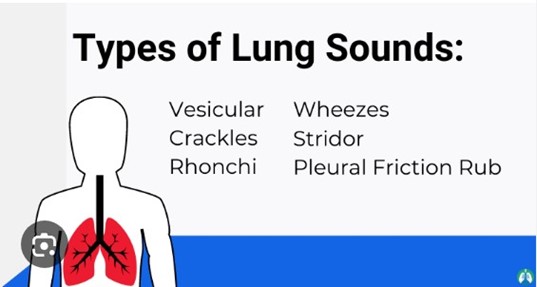The practical nurse (PN) is assisting with the admission of a client with complications of left-sided heart failure. Which focused assessment should the PN implement first?
Heart sounds
Chest pain
Bilateral lung sounds
Mood and affect
The Correct Answer is C
c) Bilateral lung sounds.
Explanation:
When admitting a client with complications of left-sided heart failure, the practical nurse (PN) should prioritize assessing the client's bilateral lung sounds. Left-sided heart failure can result in the accumulation of fluid in the lungs, leading to pulmonary congestion and impaired gas exchange. By auscultating the client's lung sounds, the PN can assess for the presence of crackles, wheezes, or diminished breath sounds, which are indicative of pulmonary congestion and fluid accumulation. This assessment helps to identify the severity of the client's condition and guides further interventions and treatment.
While assessing heart sounds (option a) is important in evaluating cardiac function, assessing lung sounds takes priority as pulmonary congestion is a common manifestation of left-sided heart failure. Chest pain (option b) is a significant symptom that should be assessed promptly, but in this scenario, the focus is on assessing for signs of pulmonary congestion and impaired gas exchange. Assessing the client's mood and affect (option d) is important for a comprehensive assessment, but it is not the priority when the client is admited with complications of left-sided heart failure.
The other options are considered incorrect because they are not the priority assessments when admitting a client with complications of left-sided heart failure.
Option a) Heart sounds: While assessing heart sounds is important in evaluating cardiac function, the priority in this scenario is to assess for pulmonary congestion and impaired gas exchange. Assessing bilateral lung sounds allows the practical nurse to gather immediate information about the client's respiratory status and the presence of fluid in the lungs.
Option b) Chest pain: Chest pain is a significant symptom that should be assessed promptly, as it could indicate various cardiac or respiratory conditions. However, in this specific scenario, the priority is to assess for signs of pulmonary congestion, which can have a more immediate impact on the client's respiratory function.
Option d) Mood and affect: Assessing the client's mood and affect is important for a comprehensive assessment of their emotional well-being. However, when admitting a client with complications of left- sided heart failure, the priority is to assess their physical condition, particularly the respiratory status, to address any immediate concerns related to pulmonary congestion and impaired gas exchange.
 |
Nursing Test Bank
Naxlex Comprehensive Predictor Exams
Related Questions
Correct Answer is A
Explanation
Choice A reason: Monitoring vital signs and neurological status frequently is the priority intervention for the client because it can detect changes in the client's condition, such as increased intracranial pressure, bleeding, or infection, that require immediate action.
Choice B reason: Maintaining strict bed rest to minimize cerebral blood flow is not the priority intervention for the client because it can increase the risk of complications such as deep vein thrombosis, pulmonary embolism, or pneumoniA. The client should be positioned with the head of the bed elevated at 30 degrees to reduce intracranial pressure and facilitate drainagE.
Choice C reason: Administering anticoagulant medications as prescribed is not the priority intervention for the client because it can worsen the bleeding and increase the risk of hemorrhagic transformation. Anticoagulants are contraindicated for clients who have hemorrhagic stroke, which is caused by rupture of a blood vessel in the brain.
Choice D reason: Assisting the client with active range of motion exercises is not the priority intervention for the client because it can cause fatigue, pain, or injury to the affected limbs. The client should be assisted with passive range of motion exercises to prevent contractures and maintain joint mobility.
Correct Answer is B
Explanation
Choice A reason: Fluconazole (Diflucan) is not a medication that community members exposed to anthrax will need access to because it is an antifungal drug that treats fungal infections, not bacterial infections. Anthrax is caused by Bacillus anthracis, a gram-positive spore-forming bacterium.
Choice B reason: Ciprofloxacin (Cipro) is a medication that community members exposed to anthrax will need access to because it is an antibiotic drug that treats bacterial infections, including anthrax. Ciprofloxacin is one of the recommended drugs for post-exposure prophylaxis and treatment of anthrax by the Centers for Disease Control and Prevention (CDC).
Choice C reason: Varenicline (Chantix) is not a medication that community members exposed to anthrax will need access to because it is a smoking cessation drug that helps people quit smoking, not treat infections. Varenicline has no effect on anthrax.
Choice D reason: Potassium iodide (KI) is not a medication that community members exposed to anthrax will need access to because it is a thyroid-blocking agent that protects against radioactive iodine exposure, not bacterial exposurE. Potassium iodide is used in case of nuclear accidents or attacks, not bioterrorism attacks involving anthrax.
Whether you are a student looking to ace your exams or a practicing nurse seeking to enhance your expertise , our nursing education contents will empower you with the confidence and competence to make a difference in the lives of patients and become a respected leader in the healthcare field.
Visit Naxlex, invest in your future and unlock endless possibilities with our unparalleled nursing education contents today
Report Wrong Answer on the Current Question
Do you disagree with the answer? If yes, what is your expected answer? Explain.
Kindly be descriptive with the issue you are facing.
